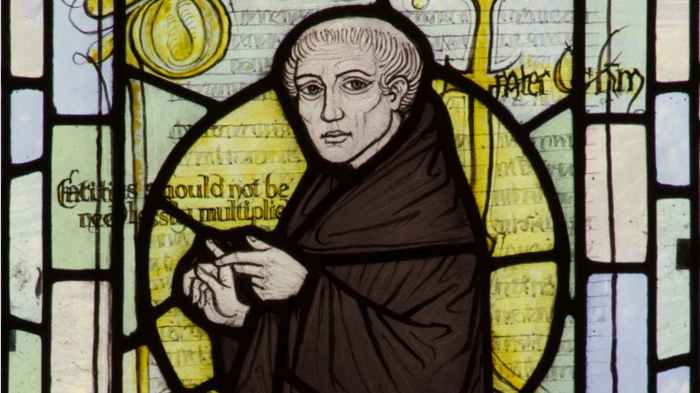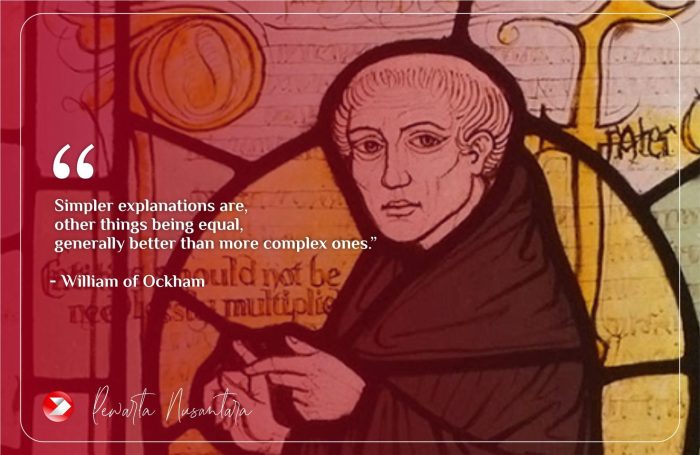English philosopher william of ___ – English philosopher William of Ockham, a towering figure of the 14th century, left an indelible mark on the intellectual landscape. His groundbreaking ideas in philosophy, logic, and political thought continue to resonate today, shaping our understanding of the world around us.
From his birthplace in Ockham, Surrey, to his influential teachings at the University of Oxford, William of Ockham’s life and work were marked by intellectual rigor and a relentless pursuit of truth. His philosophical system, known as Ockhamism, emphasized the importance of experience and skepticism towards abstract concepts.
Biography

William of Ockham was born around 1285 in Ockham, Surrey, England. He studied at the University of Oxford, where he became a Franciscan friar. Ockham was a prolific writer, and his works on logic, metaphysics, and theology had a profound influence on subsequent philosophy.
Ockham lived during a time of great intellectual and political ferment. The papacy was in conflict with the French monarchy, and the church was facing challenges from within and without. Ockham’s philosophical views were shaped by these events, and he developed a system of thought that emphasized the importance of reason and experience.
Philosophical Views

Ockham’s philosophical system, known as Ockhamism, is based on the principle of parsimony, or “Ockham’s razor.” This principle states that the simplest explanation is usually the correct one. Ockham applied this principle to all areas of philosophy, from metaphysics to ethics.
Ockham’s theory of knowledge is based on experience. He argued that we can only know what we can experience, and that abstract concepts such as universals are not real.
Nominalism
Ockham’s theory of nominalism is one of his most important contributions to philosophy. Nominalism is the view that universals do not exist. Ockham argued that universals are merely names that we give to groups of similar things. For example, the universal “dog” does not exist; there are only individual dogs.
Ockham’s nominalism had a profound influence on subsequent philosophy. It led to the development of modern science, which is based on the idea that the world is made up of individual objects, not abstract concepts.
Logic and Epistemology
Ockham was also a major contributor to logic and epistemology. He developed a theory of mental concepts that is based on the idea that we can only know what we can experience. Ockham’s theory of mental concepts has been influential in the development of modern philosophy of mind.
Political Philosophy, English philosopher william of ___
Ockham’s political philosophy is based on the idea that the state is a necessary evil. He argued that the state is necessary to protect the rights of individuals, but that it should be limited in its power.
Ockham’s political philosophy had a profound influence on the development of modern political thought. It led to the development of modern theories of sovereignty, which are based on the idea that the state has the ultimate authority within its territory.
Influence and Legacy
William of Ockham was one of the most important philosophers of the Middle Ages. His ideas had a profound influence on subsequent philosophy, science, and political thought. Ockham’s legacy continues to this day, and his ideas are still debated by philosophers today.
FAQ Guide: English Philosopher William Of ___
What is William of Ockham’s most famous principle?
William of Ockham is best known for his principle of parsimony, also known as Ockham’s razor, which states that among competing explanations, the one with the fewest assumptions is most likely to be correct.
What was William of Ockham’s view on universals?
William of Ockham was a nominalist, meaning he believed that universals (such as “humanity” or “redness”) do not exist independently of individual objects. He argued that universals are merely mental concepts that we use to group similar objects.
How did William of Ockham’s ideas influence the development of modern science?
William of Ockham’s emphasis on experience and skepticism towards abstract concepts paved the way for the development of modern science. His ideas encouraged scientists to rely on empirical evidence and to reject overly complex or speculative theories.